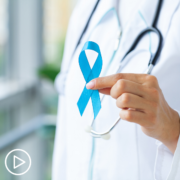Advanced Prostate Cancer Treatments on the Horizon
Advanced Prostate Cancer Treatments on the Horizon from Patient Empowerment Network on Vimeo.
What advanced prostate cancer treatments are on the horizon? Expert Dr. Ronald Chen discusses emerging treatments that are under study, the advantages that the treatments might offer, and how patients can potentially gain access to the therapies.
See More from START HERE Prostate Cancer
Related Resources:

How Is Advanced Prostate Cancer Explained to Newly Diagnosed Patients? |

|

START HERE | Collaborative Prostate Cancer Care Resource Guide |
Transcript:
Lisa Hatfield:
Are there any promising treatments on the horizon that you are particularly excited about for advanced prostate cancer? And what types of questions do you recommend patients and their care partners ask of their providers?
Dr. Ronald Chen:
I want to answer this question from the perspective of a…as a radiation oncologist. I am often involved in a lot of research and clinical trials related to how we can potentially better use the tool of radiation for patients with prostate cancer and advanced prostate cancer. And there’s actually quite a bit of exciting development in radiation that I think I’m really looking forward to seeing the results of those types of research. One area of, I think, promising treatment is something called radiopharmaceutical therapy.
So oftentimes, we think of radiation as a patient…there’s a machine that delivers a targeted beam of radiation to a particular tumor. And that’s what we usually think about. But actually, there’s a new wave of radiation and how we deliver it called radiopharmaceuticals. And radiopharmaceuticals is almost like getting chemotherapy. It’s something that’s infused into the bloodstream, almost like chemotherapy, but the way this treatment work called radiopharmaceuticals is that you’re actually infusing molecules that will actually tag on to tumor cells in the body, and then as it tags onto tumor cells in the body, deliver radiation to that tumor cell.
And they’re actually…so actually, it’s kind of like chemotherapy delivering actually radiation instead of a drug. And there are actually already are several of these radiopharmaceutical agents that have been proven to be effective. And two of these have already been FDA approved that are now in use for prostate cancer. And we know they work and they extend survival. And so, I think that’s very exciting.
And one of them is called lutetium Lu 177 vipivotide tetraxetan (Pluvicto). You’re infusing a molecule that specifically tags on to prostate cancer cells in the body and delivers a little bit of radiation to that cell. And that extends survival for patients. It’s actually a very well-tolerated treatment as well as actually now commonly in use FDA-approved. And I think that now that we have a couple of these FDA-approved, they were proven to work, I really do think that this field of radiopharmaceutical treatment will continue to expand. There’ll be more and more of these in the future. There’s more in clinical trials, and I think there’ll be more and more available options in the future. And I think it’s really going to be a great way to potentially use radiation to help patients with advanced prostate cancer and other cancers in the future.
Another thing that I’m really excited about is, again, I think the balance between extending a patient’s life expectancy and balancing the quality of life impact. We know that for patients with advanced prostate cancer, a common way to treat this disease is with hormone therapy. And oftentimes, people are on hormone therapy for years and years and maybe lifelong. And we also know that hormone therapy in patients with prostate cancer can also have really quite a bit of side effects. It can make people fatigued, weight gain, it may have cardiovascular disease impact. And so hormone therapy, even though it’s effective for prostate cancer, really has a big quality of life impact on patients.
So one of the current years of research and in clinical trials is, can we, instead of having patients with metastatic prostate cancer, instead of having them on hormone therapy for life, could we potentially use radiation selectively in the spots of metastasis? And if we’re able to use radiation to treat particular spots of metastasis and that’s controlled, can we let the patient then have a break from hormone therapy, which I think would really have an important quality of life improvement.
And so selectively using radiation to treat a few spots, allowing patients a break from hormone therapy is another area of research. There’s actually a couple of clinical trials already done on this. And what it’s shown so far is that if patients have one to three to five, a few spots of metastasis, using radiation can actually give patients a break from hormone therapy for two, three or four years for many patients. And that can really have a major impact on improving quality of life without compromising their survival outcomes. So I think I’m really excited about those kinds of areas of research.
One more treatment option like radiopharmaceuticals, two treatments that not compromise the patient’s survival, but improve quality of life. I’m excited about those directions. Oftentimes, the new developments and new treatments, the promising treatments are first available through clinical trials, and only through participating in clinical trials do you have access to that before it becomes FDA-approved. And oftentimes, that could be a really good option to consider. So that’s why I think it’s really important to ask that for every patient.
How Can Prostate Cancer Collaborative Care Be Coordinated?
How Can Prostate Cancer Collaborative Care Be Coordinated? from Patient Empowerment Network on Vimeo.
How can collaborative care of prostate cancer patients be coordinated? Expert Dr. Ronald Chen discusses typical members of a prostate cancer multidisciplinary team, potential treatment goals, and treatment logistics that are commonly coordinated.
See More from START HERE Prostate Cancer
Related Resources:

How Is Advanced Prostate Cancer Explained to Newly Diagnosed Patients? |

|

START HERE | Collaborative Prostate Cancer Care Resource Guide |
Transcript:
Lisa Hatfield:
Dr. Chen, how do you collaborate with a patient’s medical oncologist or primary care doctor when coordinating treatment options, especially if you have a patient coming in and is being seen by a community center or coming in from a rural area?
Dr. Ronald Chen:
I think cancer care is almost always multidisciplinary. And for a patient to have the best treatment and the best outcome available, and the outcome could be survival, their outcome could be quality of life, for the patient to have the best outcome, having the expertise of multiple different types of oncologists is really, really important.
And that includes a medical oncologist, that includes a radiation oncologist, and also often includes a surgeon, and for prostate cancer, that surgeon’s usually a urologist. And so having a team work together so then each specialist can offer their best treatment available and working together will result in the best outcome for each patient. As a radiation oncologist, I work very closely with my medical oncology colleagues in the care of patients.
Patients with advanced prostate cancer often need radiation to the prostate, radiation to areas of metastasis, radiation to the bone if there’s metastasis to prevent a fracture. So oftentimes, patients will need radiation treatment throughout the course of their treatment. And it’s really important to coordinate between medical oncology and radiation oncology in terms of the sequence of treatment. Does hormone therapy go first? Does radiation go first? Does chemotherapy go first? Does radiopharmaceutical treatment go next?
So being able to work together with a specialist team to coordinate treatment, I think, is really important. And even for patients who live in areas where there may be less resources or less availability of specialists, I think this is still really important. Radiation treatment has evolved a lot in the last 10, 20 years.
And oftentimes, radiation treatment for, let’s say, metastatic disease, it could be as few as one treatment. And so, for patients to be able to hear about that option, hear about potentially as few as one radiation treatment, how that could potentially really impact and help a patient is important, even for patients who live in rural communities, and maybe you have to drive half an hour, an hour, maybe a couple of hours, oftentimes one treatment will still be feasible, especially if it’s an important part of the patient’s care. And so coordination among the specialists is important, and having access to treatment, radiation, I think is also very important to make sure the patient does the best that they can.
How Is Advanced Prostate Cancer Explained to Newly Diagnosed Patients?
How Is Advanced Prostate Cancer Explained to Newly Diagnosed Patients? from Patient Empowerment Network on Vimeo.
How can advanced prostate cancer be explained to newly diagnosed patients and loved ones? Expert Dr. Yaw Nyame with the University of Washington shares key information that he explains at diagnosis and proactive advice for care partners.
See More from START HERE Prostate Cancer
Related Resources:

|

|

START HERE | Collaborative Prostate Cancer Care Resource Guide |
Transcript:
Lisa Hatfield:
Dr. Nyame, how do you explain advanced prostate cancer to your newly diagnosed patients and care partners?
Dr. Yaw Nyame:
A new cancer diagnosis, obviously, is always a big stressor for patients, and one of the things that I start with is, where is your cancer? And so when we talk about localized cancer, I always try to give the information for patients to understand that is a cancer that we think are solely in the prostate alone, and I think an advanced cancer is going to be anything that’s outside of the prostate, whether that’s in lymph nodes, close to the prostate in the bone or other organs further away from the prostate.
And I think the important thing that I try to really clarify when we’re talking about an advanced cancer diagnosis is that those are the cancers that are hard to cure, but we do have a lot of fantastic options for extending life and for preserving quality of life, and those really become the focus when we talk about most advanced cancers. And I think understanding how to build a team that will help you support those goals of care is really important, but if you don’t know really clearly, and at least to the best of your ability, what you want to see happen in your care, I think it’s hard to then advocate for those things.
La Historia de Jamal: Una Búsqueda de Claridad en la Cara del Cáncer de Próstata Avanzado
La Historia de Jamal: Una Búsqueda de Claridad en la Cara del Cáncer de Próstata Avanzado from Patient Empowerment Network on Vimeo.
El diagnóstico de Jamal, un paciente con cáncer de próstata avanzado, fue un shock a sus 50 años. Vea cómo comparte su experiencia desde el diagnóstico, una segunda opinión y el tratamiento, y sus consejos clave para mantenerse en la senda del empoderamiento del paciente.
See More From [ACT]IVATED Prostate Cancer
Related Resources:

|

|

|
Transcript:
Mi nombre es Jamal y me diagnosticaron un cáncer de próstata avanzado a los 50 años. Soy negro y el diagnóstico de cáncer de próstata me sorprendió. Lo único inusual que había experimentado era un chorro de orina ligeramente más débil, que en aquel momento descarté como nada.
Aunque me someto a revisiones médicas anuales, descubrieron mi elevado nivel de PSA durante unas pruebas gratuitas de detección del cáncer de próstata en mi iglesia. Me remitieron a un oncólogo que me hizo una biopsia y un TAC para ayudarme en el diagnóstico y el tratamiento. Tras recibir los resultados, me informaron de mi diagnóstico de cáncer de próstata avanzado y me quedé bastante sorprendido. Mi oncólogo me recomendó terapia hormonal y cirugía para extirparme la próstata. Como a mucha gente, me preocupaba la idea de operarme. Decidí pedir una segunda opinión a otro oncólogo.
Me gustó mucho la segunda oncóloga en cuanto la conocí. Sentí que me escuchaba de verdad y que atendía mis preocupaciones sobre la cirugía. Después de ver los resultados de mis pruebas, me recomendó una terapia hormonal que podría necesitar un seguimiento con una nueva terapia hormonal para tratar mi cáncer de próstata avanzado. Me sentí aliviado y esperanzado sobre mi plan de tratamiento.
Aunque experimenté algunos efectos secundarios de fatiga y pérdida de libido, mi terapia hormonal fue eficaz. Mi esposa también fue una compañera de cuidados increíble durante este tiempo. Mi tratamiento inicial fue suficiente para eliminar el cáncer, y sigo haciéndome exploraciones cada seis meses para asegurarme de que sigo estando libre de cáncer. Me encuentro bien y disfruto de una vida plena con mi esposa, mis hijos y mis nietos. También me gusta el senderismo, el tenis y viajar. Estoy muy agradecido a mi familia y amigos por su apoyo, y me complace compartir mi historia sobre el cáncer para ayudar a otras personas que acaban de ser diagnosticadas. El cáncer da miedo, pero tu viaje puede ser más llevadero con la ayuda de una excelente atención oncológica y el apoyo de los que te quieren.
Algunas de las cosas que he aprendido en mi viaje a través del cáncer de próstata avanzado son:
- Obtenga una segunda opinión si cree que la necesita. Una segunda opinión no es algo de lo que debas sentirte culpable en tu búsqueda del mejor tratamiento avanzado para el cáncer de próstata.
- Busque atención o una consulta en un centro oncológico académico si es posible. Estas instituciones están mejor equipadas para mantenerse al día sobre las últimas opciones de tratamiento avanzado del cáncer de próstata.
- Pregunte por las opciones de ensayos clínicos. Puede haber programas que le ayuden con los gastos de viaje, alojamiento y otros gastos no cubiertos.
- Si crees que puedes ayudar a los demás, únete a un grupo de apoyo para compartir tu historia. Compartiendo mi historia he sido una bendición para poder ayudar a otros que quizá sufran en silencio.
Estas acciones para mí fueron clave para seguir en mi camino hacia el empoderamiento.
Jamal’s Story: A Quest for Clarity in the Face of Advanced Prostate Cancer
Jamal’s Story: A Quest for Clarity in the Face of Advanced Prostate Cancer from Patient Empowerment Network on Vimeo.
Advanced prostate cancer patient Jamal’s diagnosis came as a shock in his mid-50s. Watch as he shares his experience from diagnosis, a second opinion, and treatment and his key advice for staying on the path of patient empowerment.
Disclaimer: This cancer patient story has been edited to protect the privacy of certain individuals, and the names and identifying details have been changed.
See More From [ACT]IVATED Prostate Cancer
Related Resources:

|

|

|
Transcript:
My name is Jamal, and I was diagnosed in my mid-50s with advanced prostate cancer. I’m a Black man, and my prostate cancer diagnosis came as a surprise. The only unusual thing I had experienced was a slightly weaker urinary stream, which I dismissed as nothing at the time.
Even though I go for annual medical checkups, my high PSA level was discovered during free prostate cancer screenings at my church. I was referred to an oncologist who ordered a biopsy and CAT scan to aid in my diagnosis and treatment. After receiving my results, I was informed of my advanced prostate cancer diagnosis and was pretty shocked. My oncologist recommended hormone therapy and surgery to remove my prostate. Like many people, I was worried about the idea of having surgery. I decided to get a second opinion from another oncologist.
I really liked the second oncologist as soon as I met her. I really felt like she was truly listening to me and to my concerns about surgery. After looking at my test results, she recommended hormone therapy that might need follow-up with a novel hormonal therapy to treat my advanced prostate cancer. I felt both relief and hopeful about my treatment plan.
Even though I experienced some side effects of fatigue and loss of libido, my hormonal therapy was effective. My wife was also an amazing care partner during this time. My initial treatment was enough to take care of the cancer, and I continue to get scans every six months to ensure that I remain cancer-free. I’m feeling well and enjoy a full life with my wife, kids, and grandkids. I also enjoy hiking, tennis, and traveling. I’m so grateful to my family and friends for their support, and I’m happy to share my cancer story to help others who are newly diagnosed. Cancer is scary, but your journey can be eased with the help of excellent oncology care and support from those who love you.
Some of the things I’ve learned on my advanced prostate cancer journey include:
- Empower yourself by getting a second opinion if you feel like you want one. A second opinion is nothing to feel guilty about in your journey to seek your best advanced prostate cancer care.
- Seek care or a consultation at an academic cancer center if possible. These institutions are better equipped to stay abreast about the latest advanced prostate cancer treatment options.
- Ask about clinical trial options. There may be programs that will help you with travel, lodging, and other uncovered expenses.
- If you feel like you can help others, join a support group to share your story. Sharing my story has been a blessing in disguise so that I can help others who may be suffering in silence.
These actions for me were key to staying on my path to empowerment.
[ACT]IVATED Prostate Cancer Patient Plan



